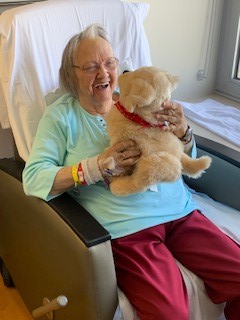





Awards and Achievements
Robotic Pet Therapy: 2 ACE Unit Staffers Honored for Innovative Approach to Patient Care
Published: Jan. 3, 2023
Two staff members in the Methodist Hospital Acute Care for Elders (ACE) Unit were recently honored for their work to improve the quality of care for patients and prevent delirium.
Registered nurse Unita Kham, MSN, RN-BC, and nurse coordinator Karen Huston, BSN, RN-BC, were presented with Nurses Improving Care for Healthsystem Elders (NICHE) Trailblazer Awards for their work using robotic pet therapy sessions with patients.
The use of robotic pets stemmed from Kham’s and Huston’s involvement in Methodist Hospital’s Professional Advancement Clinical Excellence Recognition (PACER) Program, which includes a quality improvement project.
Knowing that delirium is common in older hospitalized adults, Kham and Huston sought to discover if using robotic pets – small animals that respond to human touch and make lifelike sounds and movements – in patient therapy was more effective than conventional nursing care.
“The majority of the patients and their family enjoyed the pets,” Kham said. “A patient’s son stated that the patient loved the pet and added that she was laughing and smiling. Another patient couldn’t wait to show her cat to her family when they came for a visit. Seeing patients positively interacting and engaging with their pets – petting them and talking to them – was rewarding.”
Said Huston: “I still remember the look on our first patient's face when she saw her robotic pet. She was smiling from ear to ear. Her face lit up. She was so happy. When her son saw how she responded to it, he was blown away. He said, ‘That is better than any pill or medicine that a doctor can give my mom.’”

Among the other findings:
- Robotic pet therapy had a positive impact on patient engagement and mood.
- Patients receiving the therapy used their call lights less frequently.
- 40% of study participants named their pet.
- A nonverbal patient spoke and named her dog “Abby.”
- Staff members in other areas of the hospital began requesting pets for their patients.
- A nurse reported that after two hours of robotic pet therapy, a patient who was previously tearful and lonely became calm.
“It was nice to be able to witness firsthand the positive effect the robotic pets had on our patients,” said Ginger Gifford, MSN, RN, SCRN, service leader for the ACE Unit. “Delirium prevention was the goal, but an inherent bonus was the way patients lit up. They loved the feeling of companionship.”
Kham and Huston said they’re proud to be part of the PACER Program and such an impactful project.
“It means that Methodist Hospital and nursing leadership appreciate efforts taken to improve outcomes for patients and contribute to the nursing profession,” Kham said. “This PACER project initially started with an intention to help our patient population. The Trailblazer Award is an added bonus.”
To download a report with more information about the robotic pet therapy project, click here.
For more information about the PACER Program, visit the program page on the Methodist intranet.
